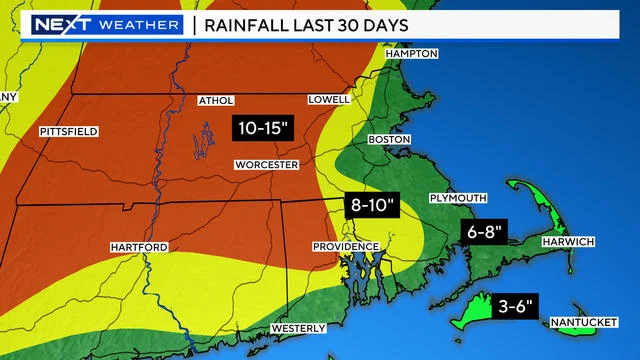Record-Breaking Rainfall and Thriving Mosquitoes
In case you missed it, this summer unleashed a mosquito frenzy like no other. Despite our best intentions, our summer evenings were often punctuated by the telltale buzz of a mosquito in search of its next meal. So, what made this summer so hospitable for mosquitoes? Let’s delve deeper into the factors contributing to this mosquito mayhem.
Record-Breaking Rainfall Numbers This Summer
Blame it on the hot, muggy, and unusually rainy weather that turned this summer into a mosquito paradise. Going from the drought last year to the uncontrollable rain this year, there is definitely a noticeable difference in the mosquito populations.
Boston typically gets around 3.27 inches of rain during the month of July. This past July, we got around 10.43 inches, making it the second rainiest July on record! Worcester and Providence, Rhode Island, also had their second wettest July on record, with 12.3 and 8.37 inches of rain, respectively.

WBZ-TV graphic
The image above highlights the total rainfall inches for the last 30 days in Massachusetts. These numbers represent what would typically be the total rainfall for the entire summer, if not more. Fifteen inches of water in parts of New England in the past 30 days is about a third of what we average in an entire year!
Mosquitoes LOVE Rainy Weather!
Heavy rains saturate the ground and create standing puddles in ditches and low spots in fields and lawns. Floodwater mosquito larvae quickly emerge after water becomes available. Eggs are placed there by females the previous year or with the previous rain event and wait for the water to return.
Floodwater mosquitoes are the first to emerge after rain events. These mosquitoes are typically larger, more aggressive, and more persistent biters from dawn to dusk.
Last summer, drought conditions spread throughout much of the state, which kept mosquito populations lower. With the rain this year, their populations have soared. Climate models have consistently predicted that the Northeast will become warmer and wetter, with more extreme rainfall events.
At Hubbard Brook, 17 of the past 20 summers have been wetter than normal, receiving more than 15 inches of rain, which is the long-term average, according to data from the research station.
It is found that warmer weather also impacts mosquitoes. In 55-degree weather, mosquitoes took 20 days to mature, while at 75 degrees, it took them less than 10 days. With climate change, new kinds of mosquitoes are coming to New Hampshire carrying diseases like West Nile Virus and Eastern Equine Encephalitis.
Research shows that fall is coming later, increasing the number of days when mosquitoes abound. This means that mosquito season is getting longer!
How Can Pure Solutions Help Offset the Rainy-Weather Mosquito Mayhem?
Our natural mosquito control sprays offer prevention and eradication solutions for whatever mosquito issues you might have. For issues with ticks, turn to Pure Solutions, the leader in organic tick & mosquito control in Massachusetts and Greater New England, for PROGAEA organic tick control spray that can tackle any lawn or property issues with ticks.
Pure Solutions All Natural Mosquito Control
✅ National Organic Program compliant and EPA 25b pest control products
✅ Safer for use around children, pets, and lawns
✅ You can be outdoors immediately after our mosquito treatments dry
✅ Our equipment is not contaminated by synthetic products
✅ Our mosquito abatement services are environment and wildlife-friendly
✅ Customizable 21-day program
Sources:
- https://www.wbur.org/news/2023/08/02/boston-rain-climate-change-flooding-massachusetts-vermont
- https://www.cbsnews.com/boston/news/boston-weather-forecast-rain-humidity-summer-new-england-2023/
- https://www.bostonglobe.com/2023/09/06/metro/record-rain-mosquitoes-window-into-new-normal/#:~:text=Last%20summer%2C%20drought%20conditions%20spread,this%20year%2C%E2%80%9D%20MacGregor%20said
